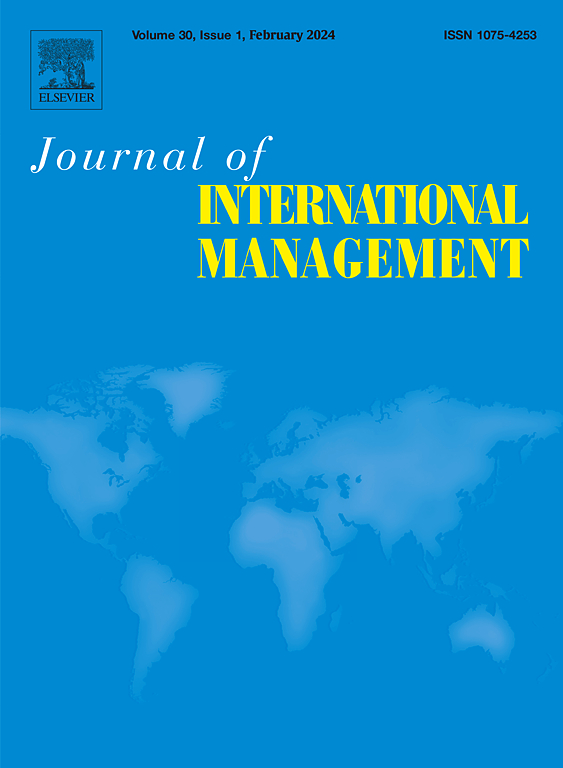When power shifts towards women or lesbian and gay coworkers: Effects on trust in coworkers and the role of firm international proactiveness
IF 4.9
2区 管理学
Q1 MANAGEMENT
引用次数: 0
Abstract
We explore the effects of perceived shifts of power towards minority groups on trust in coworkers. Drawing on intergroup threat theory (ITT), we argue that while the realistic threat of loss of power is similar across minority groups, differences in the extent to which groups are stigmatized and the application of social norms regarding equal opportunity and fairness explain different effects of threat perceptions on trust. We differentiate between gender, a surface-level diversity type, and sexual orientation, a deep-level diversity type to test whether differences between these groups explain differential effects on perceptions of threat resulting from power shifts. Additionally, we argue that suppression of local stereotypes by global social norms regarding equal opportunity and fairness is more likely to occur when individuals perceive a need to adhere to international behavioral frames. Hence, we examine firm international proactiveness as a moderator of associations between threat perceptions and trust in coworkers. Within a sample of 841 respondents across ten Latin American countries, and controlling for country-level characteristics, we find that diversity type matters, and that social norms regarding equal opportunity and fairness become more relevant to the extent that a firm is perceived to be more oriented towards global markets. Our findings suggest that organizations may increase trust among coworkers –an indicator of inclusion– by increasing awareness of concerns of less visible minority groups and by emphasizing supra-national social norms.
当权力向女性或同性恋同事转移:对同事信任的影响和公司国际主动性的作用
我们探讨了感知到的权力向少数群体转移对同事信任的影响。利用群体间威胁理论(ITT),我们认为,虽然少数群体对权力丧失的现实威胁是相似的,但群体被污名化的程度以及对平等机会和公平的社会规范的应用差异解释了威胁感知对信任的不同影响。我们区分了表层多样性类型的性别和深层多样性类型的性取向,以测试这些群体之间的差异是否解释了权力转移对威胁感知的不同影响。此外,我们认为,当个体认为需要遵守国际行为框架时,关于平等机会和公平的全球社会规范更有可能抑制当地刻板印象。因此,我们研究了公司的国际主动性作为威胁感知和同事信任之间关系的调节因子。在10个拉丁美洲国家的841名受访者的样本中,在控制国家层面的特征后,我们发现多样性类型很重要,关于平等机会和公平的社会规范在企业被认为更面向全球市场的程度上变得更加相关。我们的研究结果表明,组织可以通过提高对不太显眼的少数群体的关注意识和强调超国家社会规范来增加同事之间的信任——这是包容性的一个指标。
本文章由计算机程序翻译,如有差异,请以英文原文为准。
求助全文
约1分钟内获得全文
求助全文
来源期刊

Journal of International Management
MANAGEMENT-
自引率
9.80%
发文量
67
审稿时长
81 days
期刊介绍:
The Journal of International Management is devoted to advancing an understanding of issues in the management of global enterprises, global management theory, and practice; and providing theoretical and managerial implications useful for the further development of research. It is designed to serve an audience of academic researchers and educators, as well as business professionals, by publishing both theoretical and empirical research relating to international management and strategy issues. JIM publishes theoretical and empirical research addressing international business strategy, comparative and cross-cultural management, risk management, organizational behavior, and human resource management, among others.
 求助内容:
求助内容: 应助结果提醒方式:
应助结果提醒方式:


